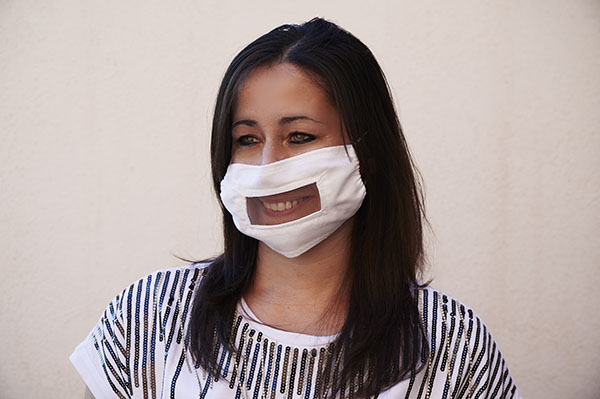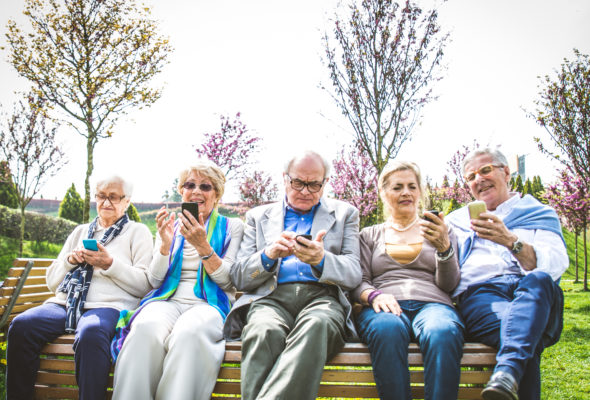How Does Wearing a Mask Affect Those with Hearing Loss?
Because of the COVID-19 pandemic, we’ve seen a dramatic increase in the number of people wearing face masks in public. Previously, mask-wearing was limited to certain occupations (such as hospitals or industrial settings). Now, some areas have mandated masks, while other people choose to wear masks for the health and safety of the community – to prevent the spread of this virus.
Communication is always a challenge for someone with hearing loss. Adding masks in public just exacerbates this problem leading to isolation, limited social interactions, and even anxiety and depression. People with hearing loss who were previously able to manage are now struggling with communication because of the widespread use of masks.
Why Mask Wearing is a Challenge
As mask-wearing is becoming common-place, it’s important to bring deaf awareness to light. One unintended consequence of wearing face masks is how it affects people with hearing loss. Here are some of the reasons why masks are making it difficult for some people:
- Lip Reading: Many individuals depend on lip reading for communication, and this option is no longer available when people’s mouths are covered. The human brain uses visual cues such as watching the lips move or full facial expressions. Wearing masks eliminates this visual information.
- Muffled Speech: Placing a mask over the mouth reduces the level of speech transmitted when someone is talking. A person with hearing loss might be able to pick up a portion of the sounds when someone is speaking without a mask. But adding the mouth covering reduces the amount of communication that can be heard.
- Mental Exertion: If a person with hearing loss is able to understand the communication, the mental exertion levels are higher as they are working hard to distinguish conversation from the background noises. As a result, communication is more taxing for people with hearing loss.
- Hearing Aids: People who use hearing aids sometimes find it difficult or uncomfortable to wear a mask. Putting the mask on and taking it off throughout the day can interfere with the positioning of the hearing aids on the ears. Great care is needed to protect this equipment and avoid damage from the elastic bands on the masks.
- Social Distancing: Another way people with hearing loss are negatively affected by mask-wearing is because of current social distancing recommendations. When people are standing farther away, the distance makes it harder for someone with hearing loss to understand the conversation. Sound levels decrease the more distance between two people.
The World Health Organization estimates that there are 1.33 billion people around the world with hearing loss. Since COVID-19 is a global pandemic, it means that a large portion of the population is facing communication challenges due to mask-wearing.
Solutions: Supporting Communication for People with Hearing Loss
Since mask-wearing is highly recommended by health organizations – and even mandated in many areas – what can be done to support communication for people with hearing loss? It’s important for everyone in the community to understand how much people with hearing loss are at a disadvantage due to communication challenges. We can all do our part to improve communication and help others around us.
These tips might help if you are talking to someone with hearing loss:
- Reduce Background Noise: Look for ways to reduce background noise whenever possible. Move to a quieter location or turn off the TV/radio that is playing in the background.
- Talk Slowly: It isn’t necessary to shout, but talking slowly and clearly can assist others in hearing your words. Improve your enunciation and avoid slurring words together.
- Clear Face Masks: Full face shields can be used as an alternative to masks over the mouth. These shields give others a full view of your mouth as you are speaking. Another option is to wear a face mask designed with a clear plastic panel over the mouth. The challenge with both of these solutions is that the plastic portion tends to fog up while you are talking.
- Face Each Other: When you are talking, make sure you are facing the other person directly instead of turning your body or face off to the side. Also, maintain eye contact to keep the focus on communication and enhance social connection.
- Ask for Feedback: As a person with hearing loss if there is anything you can do to improve communication.
If you have hearing loss, then there are a few things you can do to improve your communication with others:
- Wearing a Mask: Instead of using a face mask with an ear loop that could interfere with your hearing aids, choose a style that doesn’t hook on the ears. For example, some mask styles are designed with four strings that tie behind the head. Or, you can use button extensions for a mask with ear loops, hooking the loops behind the head with an extension attachment.
- Don’t Forget Your Hearing Aids: More than ever, it’s important that you never leave your house without your hearing aids. Regular use of hearing aids can amplify the sounds so you can participate in conversations.
- Ask Others to Speak Slowly: At the beginning of a conversation with someone new, ask them to speak slowly and clearly so you can understand.
- Speech to Text App: If you are having a hard time understanding a conversation, then a speech to text app might be a solution to help you capture the essential information.
By working together, it is possible to enhance communication so everyone can participate in the conversation.
Help for Hearing Loss
Many cases of undiagnosed hearing loss may now come to light as people lose their normal coping strategies. If you or a loved one is having a hard time with hearing and communication, then it is important that you seek support from an audiologist as soon as possible. The use of good hearing aids and assistive technology can amplify the sounds, helping you stay current in our “new normal” where many people are wearing masks.
For more information, contact our team at Fairfax Hearing Center to schedule a consultation and hearing test.




